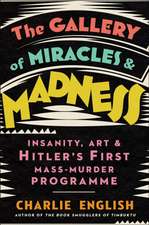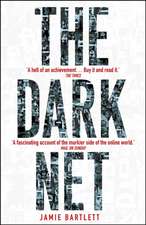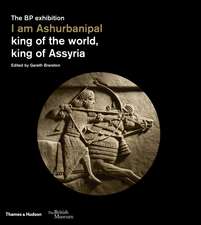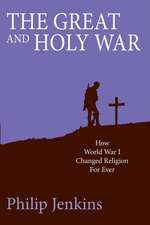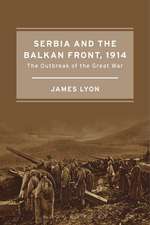The Vanquished: Why the First World War Failed to End, 1917-1923
Autor Robert Gerwarthen Limba Engleză Paperback – 28 iun 2017
For the Western allies 11 November 1918 has always been a solemn date - the end of fighting which had destroyed a generation, and also a vindication of a terrible sacrifice with the total collapse of their principal enemies: the German Empire, Austria-Hungary and the Ottoman Empire. But for much of the rest of Europe this was a day with no meaning, as a continuing, nightmarish series of conflicts engulfed country after country. In this highly original, gripping book Robert Gerwarth asks us to think again about the true legacy of the First World War.
'Lucid, incisive and packed with fascinating details'Financial Times, Books of the Year
'Important and timely ... obliges us to reconsider a period and a battlefront that has too often been neglected' Margaret MacMillan,The New York Times Review of Books
'This narrative of continent-wide chaos performs a valuable service by chronicling the postwar turmoil of Europe ... helps us understand why few wars reach tidy conclusions' Max Hastings,Sunday Times
'Reminds us, in vivid and often shocking detail, that only some countries saw killing end on the 11th day of the 11th month ... leaves a sense of foreboding for our own time' Robert Tombs,The Times
| Toate formatele și edițiile | Preț | Express |
|---|---|---|
| Paperback (2) | 80.29 lei 21-33 zile | +29.52 lei 6-12 zile |
| Penguin Books – 28 iun 2017 | 80.29 lei 21-33 zile | +29.52 lei 6-12 zile |
| Farrar, Straus and Giroux – | 181.70 lei 3-5 săpt. |
Preț: 80.29 lei
Preț vechi: 95.48 lei
-16% Nou
Puncte Express: 120
Preț estimativ în valută:
15.36€ • 16.04$ • 12.72£
15.36€ • 16.04$ • 12.72£
Carte disponibilă
Livrare economică 14-26 martie
Livrare express 27 februarie-05 martie pentru 39.51 lei
Preluare comenzi: 021 569.72.76
Specificații
ISBN-13: 9780141976372
ISBN-10: 0141976373
Pagini: 464
Dimensiuni: 129 x 198 x 21 mm
Greutate: 0.35 kg
Editura: Penguin Books
Colecția Penguin
Locul publicării:London, United Kingdom
ISBN-10: 0141976373
Pagini: 464
Dimensiuni: 129 x 198 x 21 mm
Greutate: 0.35 kg
Editura: Penguin Books
Colecția Penguin
Locul publicării:London, United Kingdom
Recenzii
This
narrative
of
continent-wide
chaos
makes
it
easier
to
understand
why
order
came
to
seem
a
supremely
desirable
objective
in
1930s
Europe,
trumping
freedom
...
it
helps
us
understand
why
few
wars
reach
tidy
conclusions:
once
a
society
has
suspended
its
instinctive,
social
and
legal
prejudice
against
killing,
it
often
proves
hard
to
restore.
Pulls together a complex narrative about the uneasy peace of the late Twenties and shine a piercing light into darkened corners of history ... an unnerving reminder of how stubbornly some geopolitical fault-lines endure
A mixture of fast-paced narrative and fluent analysis ... Gerwarth demonstrates with an impressive concentration of detail that in central, eastern and south-eastern Europe the carnage of the first world war by no means came to an end, as it did for the British and French, in late 1918.
Combining a big-picture overview with close-up detail - we hear the voices of soldiers, politicians, civilians - Gerwarth has written a vivid if disturbing account
Searing and vivid ... a timely reminder that the roots of century-long violence can be traced back to the cataclysmic end of the Great War
A thorough explanation for the rise of the nationalist and fascist groups who set the stage for World War II.
Gerwarth's fascinating and finely crafted book is a rich combination of military, political, cultural and social history. He makes good use of literary sources and witness testimony to bring the events he narrates to life ... an impressive work of highly accessible scholarship
This is an important and compelling book with a fascinating and chilling narrative ... Gerwarth reveals how the forgotten postwar violence comprised a key step on Europe's descent into darkness.
While Gerwarth's warfare theories are cogent and convincing, he never loses sight of the human dimension. He skillfully avoids the danger of getting bogged down in a mass of detail, livening up his narrative by using contemporary quotes from politicians, soldiers and writers. One mark of a good history book is that it allows the reader to see familiar events from a new perspective. In this respect,The Vanquishedis an exceptional history book.
[Gerwarth] shines a light on what is, from a western European point of view, a somewhat obscure and relatively short period of time ... from the layman's vantage point, it is so well written that it reads like a novel. Tragically, for the people killed, wounded and forced to flee from their homes, it is not. This book is well worth the read.
This fine and timely study makes a compelling case for the argument that the bloody aftermath of the war did more to destroy European civilisation than the declarations of war in 1914 ... at a time when Vladimir Putin seems intent on regaining Tsarist Russia's frontiers, and the map of the Middle East drawn by the victorious powers becomes ever more blurred, we might well ask whether the First World War has ended yet.
A clear and excellent account of the abrupt break-up of the Habsburg, Hohenzollern, Ottoman and Romanov empires and the difficult birth of their successor states during 1917-23
This is difficult, often horrifying reading, but Gerwarth provides an essential contribution to our understanding of the interwar years.
Pulls together a complex narrative about the uneasy peace of the late Twenties and shine a piercing light into darkened corners of history ... an unnerving reminder of how stubbornly some geopolitical fault-lines endure
A mixture of fast-paced narrative and fluent analysis ... Gerwarth demonstrates with an impressive concentration of detail that in central, eastern and south-eastern Europe the carnage of the first world war by no means came to an end, as it did for the British and French, in late 1918.
Combining a big-picture overview with close-up detail - we hear the voices of soldiers, politicians, civilians - Gerwarth has written a vivid if disturbing account
Searing and vivid ... a timely reminder that the roots of century-long violence can be traced back to the cataclysmic end of the Great War
A thorough explanation for the rise of the nationalist and fascist groups who set the stage for World War II.
Gerwarth's fascinating and finely crafted book is a rich combination of military, political, cultural and social history. He makes good use of literary sources and witness testimony to bring the events he narrates to life ... an impressive work of highly accessible scholarship
This is an important and compelling book with a fascinating and chilling narrative ... Gerwarth reveals how the forgotten postwar violence comprised a key step on Europe's descent into darkness.
While Gerwarth's warfare theories are cogent and convincing, he never loses sight of the human dimension. He skillfully avoids the danger of getting bogged down in a mass of detail, livening up his narrative by using contemporary quotes from politicians, soldiers and writers. One mark of a good history book is that it allows the reader to see familiar events from a new perspective. In this respect,The Vanquishedis an exceptional history book.
[Gerwarth] shines a light on what is, from a western European point of view, a somewhat obscure and relatively short period of time ... from the layman's vantage point, it is so well written that it reads like a novel. Tragically, for the people killed, wounded and forced to flee from their homes, it is not. This book is well worth the read.
This fine and timely study makes a compelling case for the argument that the bloody aftermath of the war did more to destroy European civilisation than the declarations of war in 1914 ... at a time when Vladimir Putin seems intent on regaining Tsarist Russia's frontiers, and the map of the Middle East drawn by the victorious powers becomes ever more blurred, we might well ask whether the First World War has ended yet.
A clear and excellent account of the abrupt break-up of the Habsburg, Hohenzollern, Ottoman and Romanov empires and the difficult birth of their successor states during 1917-23
This is difficult, often horrifying reading, but Gerwarth provides an essential contribution to our understanding of the interwar years.
Notă biografică
Robert Gerwarth
Cuprins
PART I: DEFEAT
A Train Journey in Spring
Russian Revolutions
Brest-Litovsk
The Taste of Victory
Reversals of Fortune
PART II: Revolution and Counter-Revolution
No End to War
The Russian Civil Wars
The Apparent Triumph of Democracy
Radicalization
Fear of Bolshevism and the Rise of Fascism
PART III: Imperial Collapse
Pandora's Box: Paris and the Problem of Empire
Reinventing East-Central Europe
Vae Victis
Fiume
From Smyrna to Lausanne
Epilogue: The "Post-War" and Europe's Mid-Century Crisis

